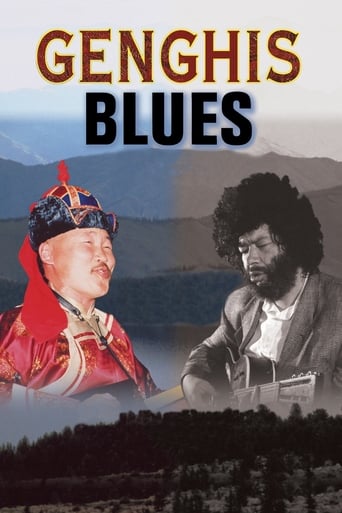birthdaynoodle
Blind, American bluesman Paul Peña was going through a very tough period in his life, particularly after having lost his wife, when he came across a CD of Tuvan throat singing, with which he absolutely fell in love. (Tuva is a region in southern Siberia, just north of Mongolia.) Peña not only taught himself throat singing and incorporated it to his blues, but also began to learn the Tuvan language by translating words from a Tuvan dictionary into Russian and then English, as he couldn't find a Tuvan-English dictionary. (Keep in mind the guy was blind.) He then made contact with the Tuvan music community and flew there to join them. He might as well have traveled across the galaxy.It's amazing how, despite the language and cultural barriers, Peña was able to establish a deep connection with his Tuvan hosts through a shared passion for music, particularly with the celebrated throat singer Kongar-ol Ondar, who took him under his wing during the visit. Seeing these two men jam and interact with each other, I had to wonder whether perhaps they'd been brothers in a previous lifetime. To think that they came from opposite sides of the world... Like Peña, the film's audience is treated to the generous spirit of Tuvan society. What hospitality! While the region wouldn't seem to offer much in terms of material luxury, their culture puts things into perspective and raises questions regarding our own values. As cliché as it might sound, they show there's nothing in life like shared joy, human warmth and communication. And that's pretty much what this film is all about!It's true that one may find more sophisticated photography and editing in other documentaries, but what this one lacks in technical virtuosity, it more than makes up for in heart. Beautiful and bittersweet, this is one film not to be missed.
Matt
This is an excellent documentary, one of the best if not the best of 1999. Very sad, and moving as well as incredibly intriguing. The film chronicles Paul Pena an old musician who was plagued by illness and blind from birth. While surfing on his ham radio Paul hears Tuvan throat singing and searches all over the place to find the source of this bizarre and fascinating music. He becomes a natural throat singer and travels to Tuva to compete in a competition. Beautiful music throughout the film, and the Tuvan countryside looks as if it is a mystical land inhabited by friendly descendent's of Genghis Kahn who maintain a rich and textured culture. This is worth while for anyone who is interested in music, documentaries or Tuva.
jarfoto
I have known Paul Pena to be a great songwriter and musician for many years. Paul, his wife "Babe" (Debby) and I shared a flat in San Francisco. After Babes passing in 1991, Paul really got into the sound of Tuva and all it held. He went on to learn the tones of the Digereedoo,(sp). The last time I saw Paul on stage was at the Roseland in Portland when he was on the road with Rat Dog. He played the "dige" and performed the art of Tuvan throatsinging at the sametime. It was a great day in April for all. All the best, JAR
Torch-6
You may have heard about "harmonic singing" or "Throat Singing," in which the performer can isolate two-to-several harmonics on their vocal cords, giving the impression that more than one voice is singing. Such a description is like saying Shakespeare wrote a couple of plays.Harmonic singing is endemic to the nation of Tannu Tuva, once a member of the USSR, now just Tuva. Brought to some notoriety by famous physicist Richard Feynman and his student Ralph Leighton, Tuva is a beautiful place, reminiscent of Montana--if Montana had been settled by the Mongol Hordes.But throat-singing is an enchanting, mystical, unreal sound--and one that takes some getting used to. "Genghis Blues" chronicles the journey of a blind bluesman to Tannu Tuva, after he stumbled across a Radio Moscow broadcast of Tuvan throat-singing, his journey to Tuva, and the people he meets there. Nominated for best documentary oscar (insert trademark nonsense here) for 1999, this film is a must-see for those who enjoy vicarious travel to places you've never even heard of.
